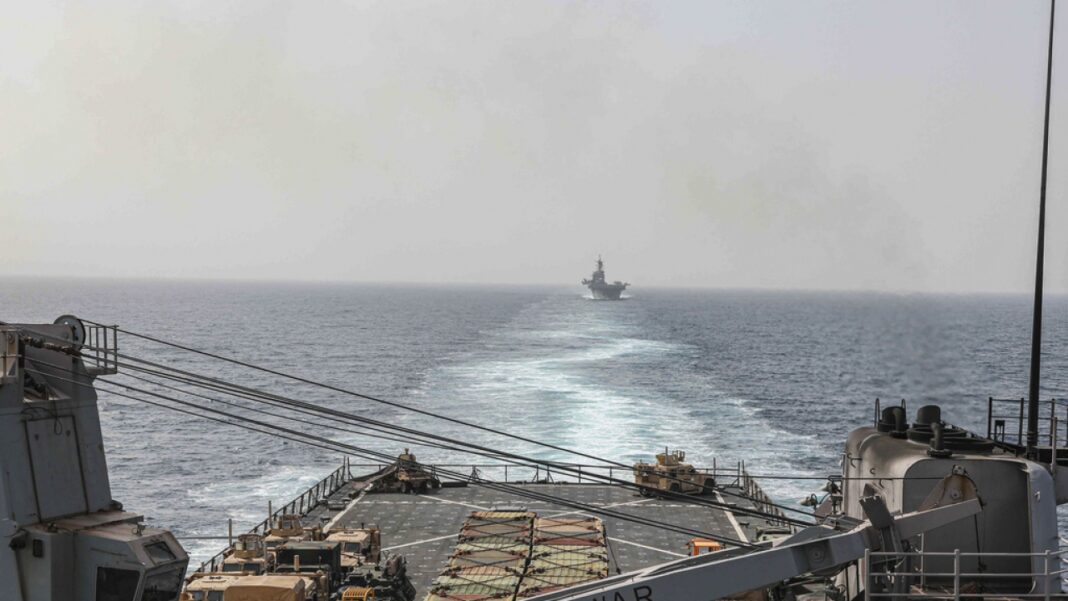Against the backdrop of the ongoing Gaza war, global attention has pivoted from the Ukraine conflict to the Middle East crisis, unveiling unexpected developments in the Red Sea. The Iranian-supported Houthi group in Yemen has thrust the historically and strategically significant Red Sea and Bab el Mandeb Strait into the forefront of international affairs.
Their deployment of drone and missile attacks targeting Israeli commercial ships navigating the narrow strait aims to exert pressure on Israel for a Gaza ceasefire. The repercussions of these actions have reverberated globally, triggering rapid responses from the US and its allies, who hastily formed an alliance to counter Houthi attacks and secure maritime transport in the region.
In a recent escalation, the Houthis executed a drone attack on the Israeli port of Eilat, while the MSC United Vessel en route from the King Abdullah port in Saudi Arabia to Karachi became a target. The Iranian-backed group has gained international attention through numerous such operations, including a shocking video depicting the takeover of an Israeli ship.
These events bear far-reaching strategic implications, initiating a complex geopolitical chain of events that jeopardizes regional stability and the global trade passing through this critical passage.
According to the United States, the Yemeni group launched over a hundred drones and missiles, targeting multiple ships. This wave of attacks has forced ships from various countries and companies to alter routes, incurring substantial expenses. The strategic vulnerability exposed by these events centres on the Red Sea, a pivotal passage connecting Asia and Europe.
The significance of the Red Sea and the Bab al-Mandeb Strait cannot be overstated in the global context. Acting as a vital maritime gateway, the Red Sea links the Mediterranean Sea to the Indian Ocean, facilitating the passage of goods, resources, and energy between Europe and Asia. At its heart lies the Bab al-Mandeb Strait, a narrow chokepoint of immense strategic value. This passage, only 18 miles wide at its narrowest point, connects the Red Sea to the Gulf of Aden and the Arabian Sea, controlling a substantial portion of the world’s trade routes. The Bab al-Mandib strait, an important gateways to the Suez Canal in Egypt, witnesses 12% of global trade, 30% of container ships, and handles 12% of the world’s oil supply and 8% of LNG.
The economic toll of these attacks is staggering, resulting in increased transit times, heightened fuel consumption, delays, and costly rerouting. European and Mediterranean states have borne the brunt of these disruptions, as ships are compelled to circumnavigate Africa, significantly inflating transportation costs.
Responding to the escalating crisis, the United States spearheaded Operation Prosperity Guardian, a multi-country coalition involving 20 countries, eight of which remain undisclosed. However, this move signals a setback for CTF 153, the Combined Maritime Force, as regional powers, notably Saudi Arabia and the United Arab Emirates, remain reluctant to join the US-led alliance against the Houthi rebels.
The operational cost is proving to be a significant challenge for the US Navy, constrained near the Horn of Africa. The Houthi rebels deploy inexpensive drones valued at $2,000 for their attacks, while the US Navy expends missiles worth over two million dollars to counter them.
Amidst this maritime turmoil, the United States grapples with global pressure to broker a Gaza ceasefire, where Israel continues its war under US veto and political cover. The international community, as reflected in a non-binding vote in the General Assembly, increasingly calls for an end to the conflict. In Europe, public opinion appears to be turning against Israel, posing a challenge to US diplomatic efforts.
These unfolding developments occur at a critical juncture for the United States, where challenges to its global leadership are mounting. The specter of de-dollarization looms, and in the competition for influence in the Southern Hemisphere, China, Russia, and India have eclipsed American dominance. Economic woes further compound the predicament, raising questions about the sustainability of US global leadership in the face of multifaceted challenges.
In the midst of this geopolitical quagmire, it’s essential to acknowledge the nuanced dynamics from a Muslim perspective. While the Houthi rebels are backed by Iran, they assert their independence rather than acting as a mere Iranian proxy. This crucial distinction reveals a complex web of motivations that extend beyond regional alliances.
The recent diplomatic thaw between Saudi Arabia and Iran, facilitated by China, further complicates the situation. Saudi Arabia, reluctant to alienate Iran and its mediator, China, finds itself in a delicate balancing act amid escalating tensions in the Red Sea.
Adding to the intricacy is the strained relationship between Saudi Arabia and the current U.S. administration. The Kingdom’s hesitancy to fully align with the U.S.-led coalition against the Houthi rebels reflects the diplomatic complexities at play. These strained relations underscore the shifting sands of global alliances and influence in the region.
Beyond the corridors of power, the sentiments among common Muslims in the region and across the world contribute to the broader geopolitical landscape. Many perceive U.S. and Israeli policies as undermining the unity of the Muslim Ummah, fostering neo-Islamist sentiments. The historical influence wielded by the U.S. in the Middle East, often through alliances with political systems such as kingdoms, emirates, sultanates, and autocratic rulers like Egypt’s Sisi, faces growing resistance.
The spectre of another Arab Spring looms large, creating apprehension for intelligence agencies like the CIA and Mossad, as well as regional rulers. The notion of grassroots movements challenging established power structures has the potential to reshape the geopolitical landscape, introducing an additional layer of uncertainty to an already complex and evolving situation. As global powers navigate these intricacies, a comprehensive understanding of the multifaceted realities in the region becomes imperative for devising diplomatic solutions that resonate with the diverse perspectives and sensitivities of the Muslim world.
Salman Lali is a contributing fellow at CommandEleven. As an experienced journalist and communications expert, Salman brings over 13 years of expertise. His focus areas include public policy, defense, international politics, and the global economy. With a keen interest in key regions such as India, China, the Middle East, Turkey, and the United States, his analyses capture the complexities of dynamics surrounding these regions. Having worked with respected broadcast houses in Pakistan, he currently serves as a communications consultant to both public and private sector clients.









